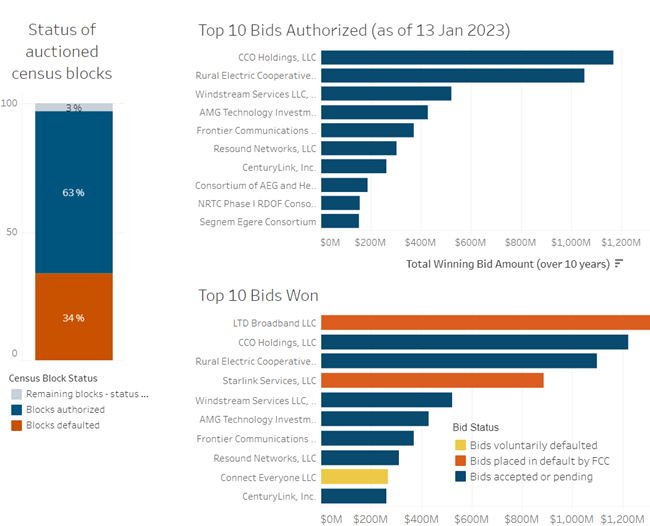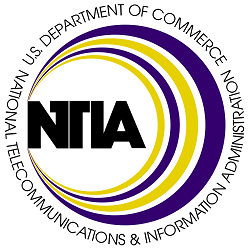
Fast, affordable Internet access for all.

Ruston, Louisiana officials say they’re throwing in the towel, and will be selling a city-owned fiber network that has existed for the better part of 15 years.
City officials say they finalized the decision at a city council meeting earlier this month, though they’d already sent out a Request for Proposal (RFP) for potential bidders as early as February.
The network was first constructed back in 2010, and consists of over 136 miles of fiber connecting roughly 300 area businesses. The network doesn’t currently service residential customers, though that could change under new ownership.
The city had briefly considered expanding the network in 2018, but scrapped the idea two years later. Ruston Mayor Ronny Walker tells the Lincoln Parish Journal that numerous factors went into the city’s decision, including new broadband construction currently being funded by a historic new wave of federal broadband infrastructure subsidies.
“Six years ago we did a study and thought about getting into the private/home internet service,” Walker said. “We were moving along that track and then four years ago, when the federal government starting putting so much money into broadband across the United States — billions of dollars to the state of Louisiana — that’s when we decided as a staff it was time to exit that business because there were so many other large companies doing that.”

Like countless communities, Ruston sees little meaningful broadband competition. Cable giant Optimum enjoys a monopoly over broadband access across much of the city, with AT&T DSL and fiber scattered across some neighborhoods. This muted competition has resulted in spotty access, slow speeds, high prices, and substandard customer service.
The Rural Digital Opportunity Fund (RDOF) was supposed to drive affordable fiber into vast swaths of long-underserved parts of rural America. And while the FCC administered program accomplished some of that goal, a multitude of problems have plagued the program since its inception, putting both current and future broadband funding opportunities at risk.
The $20.4 billion RDOF program was created in 2019 by the Trump FCC as a way to shore up affordable broadband access in traditionally unserved rural U.S. markets.
The money was to be doled out via reverse auction in several phases, with winners chosen based on having the maximum impact for minimum projected cost.
During phase one of the program, the FCC stated that 180 bidders won $9.2 billion over 10 years to provide broadband to 5.2 million locations across 49 states and the Commonwealth of the Northern Mariana Islands.
But, according to ILSR data, roughly 34 percent of census blocks that won RDOF funding–more than $3 billion in awards – are now in default. All told, 287,322 census blocks were defaulted on by more than 121 providers as of December 2023.

The defaults are only one part of a larger problem: namely that many communities bogged down in RDOF program dysfunction may risk losing out on the historic amount of federal funding to build modern broadband networks (BEAD) made possible by the 2021 bipartisan infrastructure law.
One Big Giant Mess
In the quest to unlock billions of dollars in broadband infrastructure money, Louisiana and Virginia have outpaced all other states in the speed with which they are dispatching the BEAD program’s requirements. Louisiana was the first to complete the challenge process and is still the only state to have received approval for Volume 2 of its initial proposal. Virginia, meanwhile, has completed their challenge process but now appears locked in a battle with the NTIA over the low-cost plan parameters they intend to set.
Information is trickling out about the challenge process in both states. We know that Louisiana received a reported 110,00 challenges and Virginia even more, counting 130,000 before the challenge window had even closed. It will be interesting to learn about challengers’ experience with the process, particularly for those nonprofits and local governments which have less experience with broadband mapping and data reporting. In the meantime, the states’ mandatory challenge process disclosures can give us some preliminary insight into how the challenge process is being used.
Two Maps Show Current Status of Challenge Process
NTIA guidance stipulated some transparency requirements for the post-challenge process that we are now beginning to see play out. Louisiana's and Virginia’s maps now show data on the challenges made during the process - who challenged the designation, what type of challenge they made, and, if available, the results of the adjudication process. (NTIA guidance requires “a summary of the challenge” and “a summary of the rebuttal,” which suggests slightly more detail than the maps provide.)

This week on a special edition of the podcast, join us as we begin with a discussion with local leaders from East Carroll Parish, Louisiana. First Featured on ILSR's Building Local Power podcast, this first segment reveals the hurdles the leaders faced with expensive and inadequate broadband service.
Despite resistance from a regional monopoly provider, their grassroots efforts to enhance Internet access triumphed. Explore with them on how they overcame obstacles and misleading data that was hindering competition.
Lest you think the situation in East Carroll Parish wasn't that bad, in the second segment we journey back to a 2014 episode of the Community Broadband Bits podcast. Christopher and Lisa parody the (based-on-real-life!) experience of trying to talk to the customer service of Big Cable companies, maybe hitting a little too close to home.
This show is 41 minutes long and can be played on this page or via Apple Podcasts or the tool of your choice using this feed.
Transcript below.
We want your feedback and suggestions for the show-please e-mail us or leave a comment below.
Listen to other episodes or view all episodes in our index. See other podcasts from the Institute for Local Self-Reliance.
Thanks to Arne Huseby for the music. The song is Warm Duck Shuffle and is licensed under a Creative Commons Attribution (3.0) license.
The key for states to unlock their portion of the $42.5 billion in federal BEAD funds is the submission and approval of their Five Year Action Plans and Final Proposal. The infrastructure law requires states to first file an action plan, and then prepare more detailed Initial Proposals, allowing residents and stakeholders to submit public comments.
So far, 14 states have filed their Five Year Action Plans with the National Telecommunications and Information Administration (NTIA), the Treasury Department agency in charge of allocating the funds to each state and U.S. territory. According to the NTIA’s website, Maine, Louisiana, Delaware, Georgia, Hawaii, Idaho, Kansas, Montana, North Carolina, Ohio, Oregon, Pennsylvania, Utah, and Vermont have all filed their draft Five Year Action Plans.

The states that are now in the process of completing their Initial Proposals include: Delaware, Kansas, Louisiana, Montana, Ohio, Tennessee, Vermont, Virginia and Wyoming.
Today, we will look at two states (Maine and Louisiana) and follow up with the others as we are getting a clearer picture of how each state intends to put this historic infusion of federal funds to use.
Maine
Sometimes local coalitions can beat Goliath.
In July of 2022, Louisiana Gov. John Bel Edwards and several state lawmakers visited Lake Providence in East Carroll Parish to announce the community had secured a $4 million grant to build a fiber-to-the-home (FTTH) network in one of the most poorly connected parts of the state.
But, as we first reported here, the monopoly cable provider Sparklight (formerly known as Cable One) filed a challenge to the grant claiming the cable company already serves 2,856 homes there. Following Sparklight’s multi-state campaign to prevent competition in areas where the company operates, the challenge brought the project to a grinding halt, sparking Delta Interfaith to leap into action. With the help of allied organizations, the coalition was able to secure a major victory for community broadband in rural Louisiana.

The Power of Community-based Coalitions
Residents of East Carroll Parish are “cautiously celebrating” the decision by Louisiana’s Office of Broadband Development and Connectivity to uphold a $4 million GUMBO grant to bring fiber-to-the-home (FTTH) Internet service to over 2,500 households in one of the most poorly connected parts of the state.
As we reported last month, the grant had been challenged by the regional monopoly cable provider Sparklight after the state had awarded the grant to Conexon. The challenge, which claimed the cable company already serves 2,856 homes in the region, brought the project to a grinding halt on the same day residents were set to launch a sign-up-for-service event.
News that the challenge was rejected brought a sigh of relief to members of Delta Interfaith, a coalition of congregations and community-based organizations in the Louisiana Delta pushing for better broadband. Coalition members had formed an Internet task force during the Covid-19 crisis as families struggled to get access to reliable broadband.
The community and elected officials were elated when Conexon, an independent rural Internet provider, was intially awarded the grant in July – only to be frustrated when they learned of Sparklight’s challenge. Concerned that Sparklight (formerly known as Cable One) was simply gaming the state’s grant challenge process in an effort to stave off competition, community members initiated a letter-writing campaign to bring light to the challenge and pressure state officials to resolve the challenge as soon as possible.
Sparklight 'Failed to Carry Its Burden of Proof'
The National Telecommunications and Information Administration (NTIA) announced earlier this week that Louisiana will be the first state in the nation to receive federal grant planning funds to help states prepare for the deployment of high-speed Internet infrastructure and digital skills training under the Biden Administration’s “Internet for All” initiative.
Enabled by last year's passage of the Infrastructure Investment and Jobs Act (IIJA), the $2.9 million heading to the Pelican State is from the Broadband Equity Access and Deployment (BEAD) program and the Digital Equity Act (DEA) – a development Commerce Secretary Gina Raimondo said was a signal that “the Internet for All initiative is on track and on schedule.”
Over the coming weeks, every state and territory will have funding in hand as they begin to build grant-making capacity, assess their unique needs, and engage with diverse stakeholders to make sure that no one is left behind. My thanks go to Governor Edwards and his team; Louisiana was among the first to sign onto Internet for All and to apply for funding, and I know they’re ready to get to work for the people of Louisiana.
According to NTIA’s press announcement, $2 million of the planning funds being allocated to Louisiana come from the BEAD program and will help the state:
Louisiana’s broadband deployment grant program, GUMBO (Granting Unserved Municipalities Broadband Opportunities), was announced with great fanfare by Gov. John Bel Edwards and several state lawmakers when earlier this summer they visited Lake Providence in East Carroll Parish, the first community in the state to be the beneficiaries of the $130 million grant program.
Broadband-hungry residents and businesses were licking their chops at the prospect of finally getting access to reliable high-speed Internet service in an area that had long been underserved. But what’s leaving a bad taste in the mouths of East Carroll Parish residents is an eleventh-hour challenge to the grant award by the regional cable company.
Conexon was awarded a $4 million grant to bring fiber-to-the-home (FTTH) service to over 2,500 households in the rural northeast part of the state. But the monopoly cable provider who serves the area – Sparklight (formerly known as Cable One) – filed a challenge to the grant claiming the cable company already serves 2,856 homes there, even though, as noted by The Advocate, that is nearly 1,000 more homes than what U.S. Census data reports in the project area.
The challenge has brought the project to a grinding halt on the day network construction was slated to begin. The delay has community residents and some state lawmakers frustrated as the state’s Division of Administration tries to figure out if the challenge has any real merit.
This morning, the Department of Treasury announced the first round of Capital Projects Fund (CPF) awards to states putting together portfolios to deploy new infrastructure to unserved households. Across Louisiana, New Hampshire, Virginia, and West Virginia, 200,000 locations will see new deployments capable of 100/100 Mbps at a total cost of almost $583 million.
It’s a welcome announcement that should assemble a wide range of solutions and result in much better connections for more than half a million people across the country long left behind by policy and infrastructure solutions so far. It also marks those states which have been more proactive in getting their ducks in a row as early as possible, and opening a dialogue with Treasury about how to use the CPF funds expeditiously to solve remote work, healthcare, and education in the face of the ongoing publish health crisis.
The Basics
The CPF is made up of $10 billion, and part of the $1.9 trillion American Rescue Plan Act passed last year. It complements the $350 billion State and Local Fiscal Recovery Funds (SLFRF) (which can be used for water, sewer, or broadband infrastructure) as well as the Emergency Connectivity Fund (ECF). New infrastructure must be capable of delivering symmetrical speeds of 100 Mbps. There are no local matches required (though most states are and will likely institute some form of requirement).